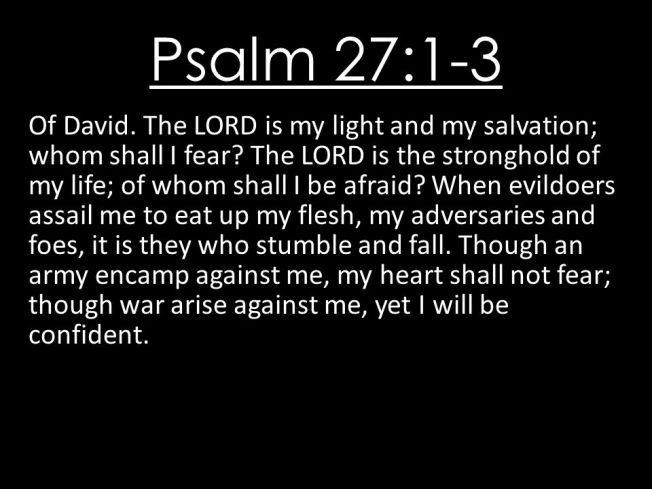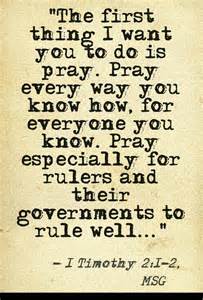“God Delivers Us from Evil”

Psalm 27:1-3 – March 17, 2019
I often stay up late at night. My light is often burning way past midnight. (If you don’t believe me, ask Sunny. She can attest to the time stamp on many of my emails being past midnight, and some 1:00, even 2:00 am.) Imagine my huge shock and horror in the wee hours of Friday morning when I saw coming across the computer news feed that there had been a mass shooting in Christchurch, New Zealand. I was absolutely devastated. Talk about shocking me out of my security and complacency!
That is the portion of the Lord’s Prayer we are focusing on this week: deliver us from evil. Please, Lord! Right now!
So many faced such evil, such horror, and such sorrow in the town of Christchurch, and all New Zealand just two days ago. Imagine, if you will, two peaceful congregations, coming together for their midday time of prayer, abruptly torn apart by semi-automatic weapon fire. Is it any wonder many people around the world cannot even visualize such an attack? What on earth? Dear Lord! Deliver us from evil!
As soon as news of this horrific shooting started to come across my computer screen, you’d better believe I checked out my various favorite go-to news sites, including the BBC News. Yes, the news was even worse than I had heard or feared. And, the death toll was rising. So were my shock, dismay and horror at the rapidly developing story.
As we consider our Scripture reading from the Psalms this morning, we can flee to the assurance and strength of the first verse of Psalm 27: “The Lord is my light and my salvation; I will fear no one. The Lord protects me from all danger; I will never be afraid.” I read these words and take heart. God is the source of my—our strength. God is our light, and we need no other light source. God is our protection and our protector. I—we—all of us need no one else.
But, wait, Lord! You didn’t mean that You would protect me from a domestic terrorist with a semi-automatic rifle! Did You?
Even though the conception of a semi-automatic rifle was not even thought of at the time the psalm writer put pen to paper and wrote this psalm, that is the gist of verses 2 and 3: “When evil people attack me and try to kill me, they stumble and fall. Even if a whole army surrounds me, I will not be afraid; even if enemies attack me, I will still trust God.”
King David is said to be the author of this Psalm, and I can believe it. David certainly knew quite a bit about having evil people try to attack him. Not only when he was young, before he even met Goliath on the field of battle, he was shepherd for his family’s flocks. He knew the many dangers a sheep or goat could face in the rocky, semi-arid pastures in the country of Israel. He was their shepherd, and he would need to rescue them when they got into trouble.
Then, when David was secretly anointed king and needed to run from the previous-but-still-on-the-throne King Saul, his fear and anxiety had the opportunity to shift into high gear. King Saul wanted to kill David. Literally. Seriously. Saul sent regular armed parties into the wilderness of Israel specifically to kill David. I am amazed that David could even write these words: “even if enemies attack me, I will still trust God.”
Dr. Beth Tanner, commentator on Psalm 27, writes “With all of the violence in our world, Christians are faced almost daily with a decision to live in fear, or despite their fear, to trust in God and God’s promises. To choose to remain true to God’s principles of hospitality feels frightening as well. Terrorists and Refugees come from the same places.” [1]
Gangs of fierce, armed men hunting you down, repeatedly? Frightening, indeed.
If we consider our problems today, whatever the specific problem is, we can draw some insight from this psalm. It’s clear that the person composing this prayer—King David—is afraid. “And yet, right in the middle of his expressions of fear, the Psalmist also declares his confident faith that God’s presence is like a light that keeps him safe. So, he seeks God’s presence in the place where the people of Israel of his day believed God could be found: in the Temple.” [2] In the same way, we can seek the Lord where we know God is to be found: in the sanctuary, with other believers, and in meditation and prayer.
A number of these peaceful people at prayer on Friday were refugees from war-torn countries. They had fled their home countries of Somalia, Syria and Iraq—just to name a few—and had finally found sanctuary in the peaceful, beautiful town of Christchurch. New Zealand has truly gorgeous scenery, and a wonderful, equitable society of friendly people.
Not the kind of place one would expect for a domestic terror attack, certainly.
Yet, to run away, to leave almost everything you found dear and loved with all your heart, to come to a foreign land, no matter how pretty, Such heartache, and such desperation. And finally, to be getting back on your feet and finding a new home, just to have your place of worship abruptly, shockingly invaded. Get all shot up.
Dear God, deliver us from Evil, personified.
Dr. Tanner goes on to say: “Gun violence comes out of nowhere and even those places we considered safe are safe no longer. Fear threatens to defeat the gifts of trust and hospitality. The feeling of the psalm is the same.” [3] It does not matter whether we ask to be delivered from evil things or evil people, from evil personified or evil within our own hearts. This psalm gives the message that we can depend on God as our light, our safety, our security, our salvation. And, if we depend on God, what more sure defender and protector do we need?
Jesus speaks to the city of Jerusalem rhetorically in the Gospel reading from Luke today: “Jerusalem, Jerusalem! You kill the prophets, you stone the messengers God has sent you! How many times I wanted to put my arms around all your people, just as a hen gathers her chicks under her wings, but you would not let me!” Jesus speaks of the image of a mother hen fluffing up her feathers and gathering her chicks to safety, under her wings. Such a wonderful maternal image! And, such an encouragement and comfort in times of trouble.
It doesn’t matter what evil approaches, what danger comes quickly. If we are gathered under the wings of Jesus as our mother hen, we will be safe and cared for—now, and wherever we go with our Lord.
May it be so, Lord. Amen.
[1] http://www.workingpreacher.org/preaching.aspx?commentary_id=2777
Commentary, Psalm 27 (Lent 2C), Beth L. Tanner, Preaching This Week, WorkingPreacher.org, 2016
[2] http://thewakingdreamer.blogspot.com/2014/01/what-do-we-have-to-fear.html
“What Do We Have To Fear?” Alan Brehm, The Waking Dreamer, 2016.
[3] http://www.workingpreacher.org/preaching.aspx?commentary_id=2777
Commentary, Psalm 27 (Lent 2C), Beth L. Tanner, Preaching This Week, WorkingPreacher.org, 2016
(Suggestion: visit me at my regular blog for 2019: matterofprayer: A Year of Everyday Prayers. #PursuePEACE – and my other blog, A Year of Being Kind . Thanks!

